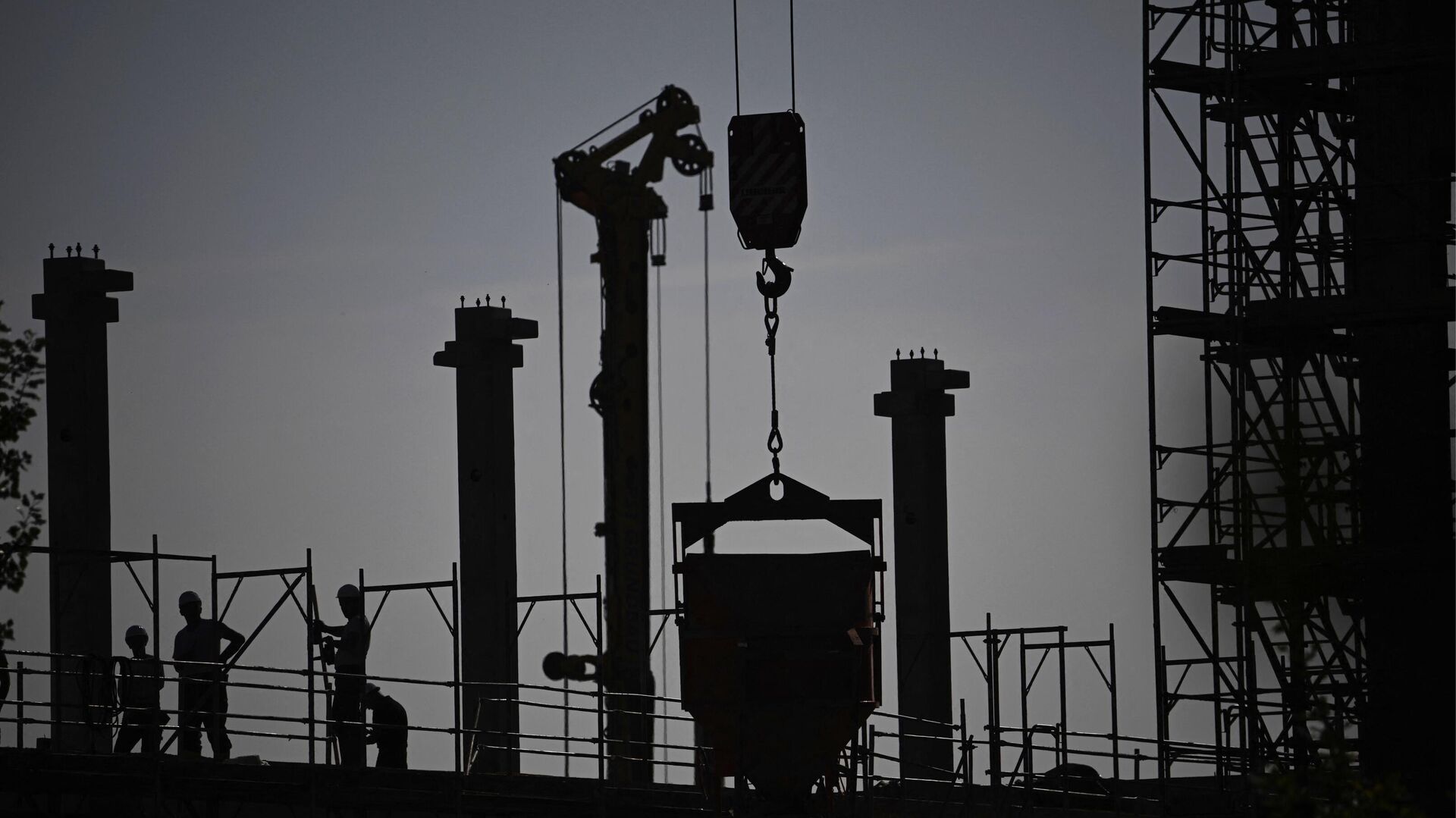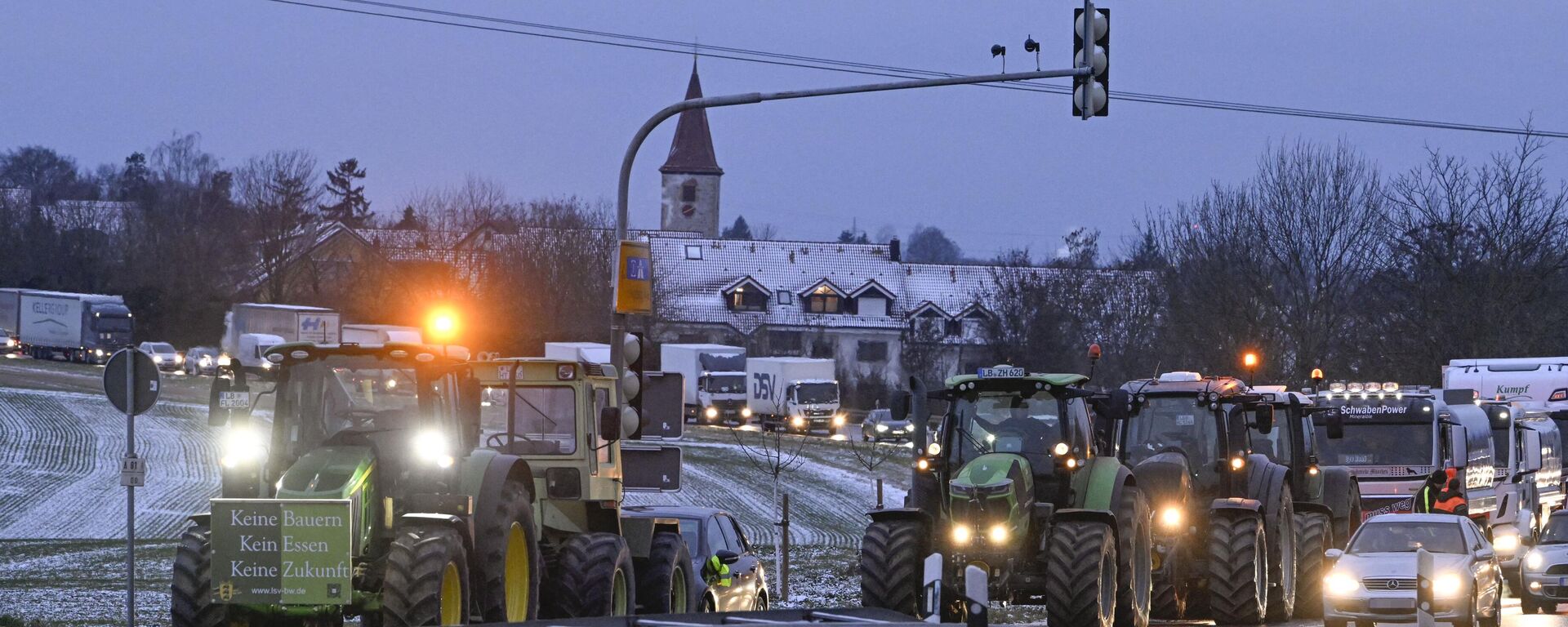https://sputnikglobe.com/20240111/german-recession-likely-to-bring-suffering-to-eu-economy-and-international-trade-1116114271.html
German Recession Likely to Bring 'Suffering' to EU Economy and International Trade
German Recession Likely to Bring 'Suffering' to EU Economy and International Trade
Sputnik International
Professor of macroeconomics and monetary economics at the University of Fribourg, Sergio Rossi, told Sputnik that there are a “number of reasons” for the recession in Germany, principally ones that “affect households’ purchasing power negatively.”
2024-01-11T12:45+0000
2024-01-11T12:45+0000
2024-01-11T12:45+0000
analysis
europe
germany
recession
economic crisis
https://cdn1.img.sputnikglobe.com/img/07e8/01/0b/1116116003_0:117:3225:1931_1920x0_80_0_0_4b96171f38509ee12c678d983969885b.jpg
The German economy is likely to remain in a recession this year, with the country’s gross domestic product decreasing by 0.3%, according to the recent forecast by the Institut für Makroökonomie und Konjunkturforschung cited by Western media.Professor of macroeconomics and monetary economics at the University of Fribourg, Sergio Rossi, has offered a similar assessment as he told Sputnik that there are a “number of reasons” for the recession, principally ones that “affect households’ purchasing power negatively.”The euro’s “weakness” in foreign exchange markets also has a detrimental impact on the situation as it “increases the costs of German imports and does not really spur German exports, since many importing countries also have their own economic problems that affect international trade negatively.”The ongoing farmer protests do not help the situation either, seeing how they may slow down or even interrupt the “supply chain” in the country, “which ramifies in other European countries that are part of the global economy,” as Rossi put it.Germany’s own woes aside, the European Union as a whole is likely going to “suffer on both economic and political grounds,” Rossi said, naming “the German recession” as a “relevant factor of economic troubles” in the EU.“A vicious circle like this will then exacerbate political conflicts both at institutional level and across the German society, which could also reduce international cohesion across the EU,” Prof. Rossi added.He also argued that the growing economic crisis could even affect Germany’s financial and military support for Ukraine, as the need to deal with its own domestic problems may soon become a priority for Berlin.“Mounting political pressures across Germany might induce this country’s government, in a not too distant future, to prioritize solving its own citizens’ problems – as regards both the households and domestic business activities – rather than continuing to provide financial support to Ukraine, so much so that the geopolitical perspectives in this regard are actually discouraging renewed support for Kiev by both the US and the European governments,” he elaborated.Germany, the economic powerhouse of the European Union, has fallen on hard times following Berlin’s 2022 decision to join in on the US-led economic warfare campaign against Russia.Western sanctions intended to cripple the Russian economy have backfired against the very countries that introduced them, with Germany especially suffering from the loss of access to cheap Russian energy that long has been a tremendous boon to its industry.Meanwhile, Russian President Vladimir Putin highlighted that Russia’s economy has become the number one in Europe and the fifth in the world based on purchasing power parity.
https://sputnikglobe.com/20240109/german-farmers-protest-economic-policy-forced-by-failed-sanctions-on-russia-1116069365.html
germany
Sputnik International
feedback@sputniknews.com
+74956456601
MIA „Rosiya Segodnya“
2024
News
en_EN
Sputnik International
feedback@sputniknews.com
+74956456601
MIA „Rosiya Segodnya“
Sputnik International
feedback@sputniknews.com
+74956456601
MIA „Rosiya Segodnya“
german economic crisis, germany recession 2024, germany farmers protests, europe germany recession
german economic crisis, germany recession 2024, germany farmers protests, europe germany recession
German Recession Likely to Bring 'Suffering' to EU Economy and International Trade
Nearly three years after deliberately severing the supply of cheap energy from Russia, Germany finds itself in a precarious situation as the largest economy in the European Union plunges into recession.
The German
economy is likely to remain in a recession this year, with the country’s gross domestic product decreasing by 0.3%, according to the recent forecast by the Institut für Makroökonomie und Konjunkturforschung cited by Western media.
Professor of macroeconomics and monetary economics at the University of Fribourg, Sergio Rossi, has offered a similar assessment as he told Sputnik that there are a “number of reasons” for the recession, principally ones that “affect households’ purchasing power negatively.”
“The majority of wage earners suffer for a relevant loss in their purchasing power, as nominal wages have been increased less than the increase in the cost of living,” Rossi explained. “Several firms have been reducing their investment expenditures as a result of both a reduced purchasing power of consumers and a too high level of the rates of interest that banks pretend in order for them to open new credit lines for business activities across the German economy.”
The euro’s “weakness” in foreign exchange markets also has a detrimental impact on the situation as it “increases the costs of German imports and does not really spur German exports, since many importing countries also have their own economic problems that affect international trade negatively.”
The ongoing
farmer protests do not help the situation either, seeing how they may slow down or even interrupt the “supply chain” in the country, “which ramifies in other European countries that are part of the global economy,” as Rossi put it.
Germany’s own woes aside, the European Union as a whole is likely going to “suffer on both economic and political grounds,” Rossi said, naming “the German recession” as a “relevant factor of economic troubles” in the EU.
“International trade will be affected negatively, because Germany is an important component of the global supply chain: its economic problems will therefore rapidly induce similar problems across the whole EU and even beyond it,” he added. “As a result, German banks and non-bank financial institutions will record a higher volume of non-performing loans that much increase Germany’s financial fragility. All this will slow down German imports from other EU countries, which thereby are also going to suffer and could fall into a recession.”
“A vicious circle like this will then exacerbate political conflicts both at institutional level and across the German society, which could also reduce international cohesion across the EU,” Prof. Rossi added.
He also argued that the growing economic crisis could even affect Germany’s financial and military
support for Ukraine, as the need to deal with its own domestic problems may soon become a priority for Berlin.
“Mounting political pressures across Germany might induce this country’s government, in a not too distant future, to prioritize solving its own citizens’ problems – as regards both the households and domestic business activities – rather than continuing to provide financial support to Ukraine, so much so that the geopolitical perspectives in this regard are actually discouraging renewed support for Kiev by both the US and the European governments,” he elaborated.
Germany, the economic powerhouse of the European Union, has fallen on hard times following Berlin’s 2022 decision to join in on the US-led economic warfare campaign against Russia.
Western sanctions intended to cripple the Russian economy have backfired against the very countries that introduced them, with Germany especially suffering from the loss of access to cheap Russian energy that long has been a tremendous boon to its industry.
Meanwhile, Russian President Vladimir Putin highlighted that Russia’s economy has become the
number one in Europe and the fifth in the world based on purchasing power parity.





